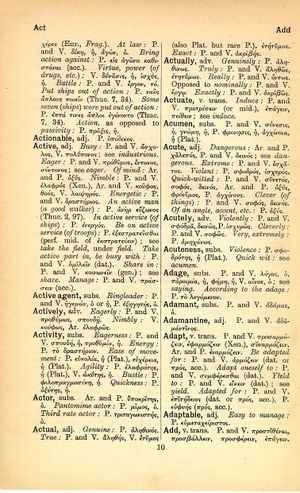active: Difference between revisions
From LSJ
(D_1) |
(Gf-D_1) |
||
| Line 1: | Line 1: | ||
{{Woodhouse1 | {{Woodhouse1 | ||
|Text=[[File:woodhouse_10.jpg|thumb|link= | |Text=[[File:woodhouse_10.jpg|thumb | ||
|link={{filepath:woodhouse_10.jpg}}]]'''adj.''' | |||
<b class="b2">Busy</b>: P. and V. [[ἄσχολος]], V. [[πολύπονος]]; see [[industrious]]. | <b class="b2">Busy</b>: P. and V. [[ἄσχολος]], V. [[πολύπονος]]; see [[industrious]]. | ||
Revision as of 07:19, 14 August 2017
English > Greek (Woodhouse)
adj.
Busy: P. and V. ἄσχολος, V. πολύπονος; see industrious.
Eager: P. and V. πρόθυμος, ἔντονος, σύντονος; see eager.
Of mind: Ar. and P. ὀξύς.
Nimble: P. and V. ἐλαφρός (Xen.), Ar. and V. κοῦφος, θοός, V. λαιψηρός.
Energetic: P. and V. δραστήριος.
An active man (a good walker): P. ἀνὴρ εὔζωνος (Thuc. 2, 97).
In active service (of ships): P. ἐνεργός.
Be on active service (of troops): P. ἐξεστρατεῦσθαι (perf. mid. of ἐκστρατεύειν); see take the field, under field.
Take active part in, be busy with: P. and V. ὁμιλεῖν (dat.).
Share in: P. and V. κοινωνεῖν (gen.); see share.
Manage: P. and V. πράσσειν (acc.).
Latin > English (Lewis & Short)
actīve: adv.,
I
v. the foll. art. fin.
Latin > French (Gaffiot 2016)
āctīvē, au sens actif : Prisc. Gramm. 8, 21.

